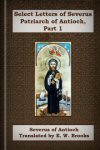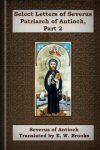Select Letters of Severus of Antioch (2 vols.)
Digital Logos Edition
Overview
In these two volumes, you can explore the letters of prominent theologian Severus of Antioch. Severus was enthroned as the Patriarch of Antioch on November 6, AD 512. Soon after, he went to Constantinople to meet with Emperor Justinian I, where Justinian attempted to sway Severus from his anti-Chalcedonian viewpoints. Severus was a chief proponent of the formulas of Dioscorus of Alexandria, and refused to change his mind. Justinian had him deposed and replaced him in Antioch with a Chalcedonian in AD 518. Severus later returned to Constantinople to attempt and heal the schism, but was unsuccessful. He was formally excommunicated in AD 536, returning to Egypt to live as an exile until his death in AD 538. Select Letters of Severus of Antioch contains over one hundred of Severus’ letters, grouped according to subject matter into 11 main sections across the two volumes.
This product will be downloaded as a single resource.

Key Features
- Contains over one hundred of Severus of Antioch’s letters
- Provides English translations from the Syriac by E.W. Brooks
- Includes an index of persons, places, and quotations
Product Details
- Title: Select Letters of Severus of Antioch
- Author: Severus of Antioch
- Editor and Translator: E.W. Brooks
- Publisher: Williams and Norgate
- Volumes: 2
- Pages: 488
This title is included in the following collections
You can save when you purchase this product as part of a collection.
Logos 8 Orthodox Gold Legacy L...
$849.99$849.99Verbum 8 Eastern Rite Gold Leg...
$849.99$849.99Logos 9 Orthodox Gold Legacy L...
$849.99$849.99Verbum 9 Eastern Rite Gold Leg...
$849.99$849.99
- $1,499.99
- $1,499.99
- $2,999.99
- $2,999.99
- $4,749.99$3,562.49
- $7,749.99
- $7,749.99
- $23,999.99$17,999.99
- $21,749.99
- $24,999.99

This volume contains part one of the selected letters of Severus of Antioch. Translator and editor E. W. Brooks provides English translations for the over 66 letters included in this volume. This text contains sections one and two of the letters, which speak to subjects related to “bishops and clergymen and their ordination,” and “his ordination before episcopacy; and about the precedence of bishops and another doubtful point regarding them; and about men who give themselves out as bishops and ordain; and about the proper ordination of bishops.” Letters are addressed to Constantine the bishop, the clergy of Apamea, Philip the Presbyter, and many others.

This volume contains part two of the selected letters of Severus of Antioch. Translator and editor E. W. Brooks provides English translations for the nearly 60 letters included in this volume. This text contains sections three through eleven of the letters, which speak to subjects related to “that one must not communicate indiscriminately or without investigation with heretics,” and “about clergymen or laymen who are converted from heresies,” “about monks and nuns,” and more. Letters are addressed to the Stephen the reader, Dioscorus archbishop of Alexandria, and many others.
Reviews
1 rating
Daniel Mcliver
5/14/2023


Paul Jeffrey Nord
3/31/2016
Does this work include the original Syriac, as well as the English translation?